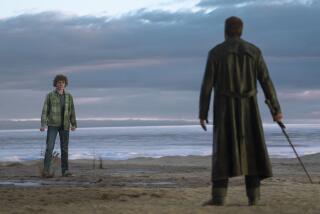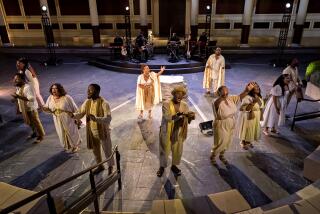The Long Way Home
- Share via
Armand Assante is putting it mildly when he wryly observes that it’s “certainly never an easy sell to try to convey a poem that’s over 2,000 years old.”
Like it happens all the time. Indeed, the audacity of thinking that it could be done--and the willingness to spend about $40 million in the effort--is what makes NBC’s gamble on a four-hour movie adaptation of “The Odyssey” so impressive. Assante stars as Odysseus, hero of the epic adventure that was written (along with “The Iliad”) by the Greek poet Homer sometime between 800 and 700 B.C.
Both Assante and director Andrei Konchalovsky (“Siberiade,” “Runaway Train”) say the big challenge was to make “The Odyssey” palatable to contemporary viewers, many of whom are not familiar with the work or haven’t read it since school.
“I hated it in school,” confesses the acclaimed Russian filmmaker. “I was thinking about soccer.”
Assante, who has starred in numerous films including HBO’s “Gotti” and “Belizaire the Cajun,” says he decided the only way he could approach Odysseus was to strip away any preconceived notions of the character. “I just concentrated primarily on making him one man caught in extraordinary circumstances,” he says. “It’s a very human story and a very contemporary story--incredibly contemporary in today’s world, especially for me.”
Assante’s Odysseus is the King of Ithaca, who, after leading his troops to victory in the Trojan War, angers the god Poseidon and ends up on a turbulent, treacherous, 10-year journey home to his loyal wife, Penelope (Greta Scacchi), and his son, Telemachus.
Isabella Rossellini plays Athena, goddess of wisdom; Vanessa Williams is the sea nymph Calypso; Eric Roberts is the evil Eurymachus; Irene Papas portrays Odysseus’ mother, Anticleia, and Bernadette Peters is featured as the enchantress Circe.
Robert Halmi Sr. (“Gulliver’s Travels”), Francis Ford Coppola, Fred Fuchs and Nicholas Meyer are the executive producers of the lavish production, which was shot in London, Malta and Turkey. Konchalovsky and Christopher Solimine penned the adaptation, and Jim Henson’s Creature Shop created the mythical creatures Odysseus meets on his journey, such as the gigantic Cyclops.
In “The Odyssey,” Assante says, Homer was writing about every man’s call to adventure, “and the price we pay emotionally, physically and psychologically for those adventures in our lives. I think mature men come to understand, certainly when they get in their 40s, that life is an incredibly brief, fragile proposition and the choices you make can literally become totally life-consuming.
“I think that’s the essence of ‘The Odyssey’--that this man underestimates the impact of a war and the price that going to war takes on his life.”
Assante only accepted “The Odyssey” because Konchalovsky was attached to direct. “I had no interest in going near this project without Andrei,” he states. “I didn’t want it to be pure spectacle--and it’s not, by the way. They are using [the spectacle aspect] to promote it.”
Konchalovsky, he says, has an “emotionalism and a humanism to his work that has always arrested me. I felt totally confident that if there was anyone in the film industry who was capable of distilling this down to something rather simple and human, it was Andrei.”
Transforming an epic poem--one that has also been called the first novel because of its exciting narrative and use of flashbacks--into a four-hour drama was a heady task for Konchalovsky. Especially, he adds, considering he only had about two months to complete the script. “It’s a very big poem and it embraces so many events, so many characters--let alone a couple of them are gods.”
“It’s challenging because it’s difficult to imagine: How do you do Zeus? How do you do Athena? To write a script out of a very big poem that deals mostly with gods and three characters, and the rest of the characters are there in the shadows, and create a right tapestry for every character to have a place--it’s a challenging thing to write.”
Konchalovsky included portions of “The Iliad” in his “Odyssey,” he says, to put the story into historical context.
“When Homer wrote ‘The Odyssey,’ everyone knew about Troy,” Konchalovsky explains. “But for the modern audience to understand that Odysseus himself was a trigger for the Trojan horse, that his intelligence and his wit brought Troy down, we had to add a little piece of ‘The Iliad’ to explore who he was. I can tell you it’s not an easy task to make a brief history of ‘The Iliad’ in seven minutes.”
Assante reports he’s “all in one piece” and “happy to be home” after filming the massive production. “There’s no question that physically it was a very challenging thing for all of us,” the actor says.
“I don’t like to hear how exorbitant the budget is,” he notes, “because the truth is, it was shot like a low-budget, independent film to get that much on film in those circumstances and logistics.
“We worked six days a week, 70 to 90 hours a week, and we did it pretty much within four months. Had it been done by a studio, it would have easily cost four or five times the amount we did it for.”
Assante hopes “The Odyssey” will inspire youngsters to read Homer’s poem.
“It’s an incredible metaphorical poem that has enriched many peoples’ lives,” Assante says. “It was probably the most important religious doctrine of its time. It still has incredible religious and theological overtones that have a great meaning to people. I think this is a positive experience for kids and young people in literature, not a negative one.”
“The Odyssey” airs Sunday and Monday at 9 p.m. on NBC.
More to Read
Only good movies
Get the Indie Focus newsletter, Mark Olsen's weekly guide to the world of cinema.
You may occasionally receive promotional content from the Los Angeles Times.











